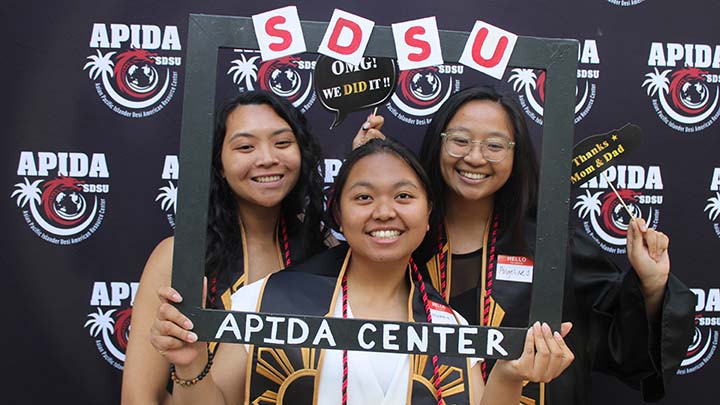SDSU’s APIDA Center Gains Support with CSU Funding Increase
CSU awarded $6.4 million in funding to campuses as part of an Asian American Native Hawaiian Pacific Islander Student Achievement Program. The funds, announced in May during APIDA Heritage and History Month, will be used to create programs and services to support low-income, underserved and first-generation AANHPI students.
The awards are part of an annual $8 million appropriation as directed by Assembly Bill 190 to establish a central statewide office. SDSU, among 19 CSU campuses applying for one-time funding last fall, received $360,000.
“The CSU AANHPI Student Achievement Program will have an indelible effect on the success of underserved and first-generation AANHPI students and other underrepresented students,” said CSU Chancellor Mildred García. “This funding is a significant milestone in supporting our universities’ efforts in strengthening their diverse campus communities and increasing opportunities for all students to attain the life-changing benefits of a CSU degree.”
As a result of advocacy from APIDA leaders across the CSU system, The Chancellor’s Office also allocated an additional $500,000 to support efforts at Asian American, Native American and Pacific Islander-serving institutions, of which $350,000 was made available to campuses in the form of mini-grants of $10,000 to $50,000 to support faculty and staff who are engaged in AANAPISI-centered work.
SDSU APIDA Center director Virginia Loh-Hagan, selected to manage the mini-grant funds for the entire CSU system, said the funding signals the system’s commitment to its Asian Pacific Islander Desi American students, faculty and staff.
“I think that it will make a difference,” Loh-Hagan said. “We will see more programming and support.
“For me, it’s powerful to even be recognized as a community,” Loh-Hagan said.
The state funding supports development of a central office for the AANPHI Student Achievement Program, to be located at Sacramento State, where ethnic studies professor Timothy Fong will serve as executive director and oversee future grant distributions.
Loh-Hagan said SDSU’s $360,000 award will fund a project called ACCESS, the APIDA College & Career Excellence in Scholarships and Success, to improve college achievement among APIDA students from underserved communities.
Two major components of the ACCESS project are:
- APIDA College Experience Success, which will create learning support communities that target at-risk students, and
- Students and Teachers for APIDA Research and Scholarship (STARS), which will build students’ academic skills and help establish an APIDA Research Center. Loh-Hagan said some of the funds will go to help create and expand an APIDA collection in the SDSU Library as well as support the SDSU Asian American Studies program.
“The funding gives us an opportunity to think about what we are doing and how we can do it better, with the ultimate goal of advancing our AANAPISI identity and supporting our students and faculty and staff,” Loh-Hagan said.
Loh-Hagan credits the new funding from the Chancellor’s Office to a collaborative effort among AANAPISI leaders that started during the height of the pandemic, when escalating anti-Asian hate led to a firm message of support for APIDA students, which comprise more than 16 percent of CSU enrollment.
That working group was spearheaded by Loh-Hagan, Fong and Simon Kim, the associate vice president for research and sponsored programs at CSU Long Beach.
“This really brought us all together in a way that we weren’t before,” Loh-Hagan said. “We know that solidarity and working together across the system is what got us the funding in the first place, so we want to ensure that we continue to have conversations and that we continue to build networks.”
At SDSU, Loh-Hagan said the funding helps continue to build toward what she sees as her ultimate goal as APIDA Center director: to make SDSU and the APIDA Center a national model for APIDA excellence.
“Having access to this funding, this support, and this recognition is pretty powerful. I hope to continue to be able to steward, develop, build, and establish a strong APIDA presence at SDSU,” she said.
With the Center entering Year 5 of its existence, Loh-Hagan said that the center has successfully planted seeds by building visibility, and is looking forward to “growing roots.”
She wants to see APIDA Center initiatives branch into academic affairs, research, and other campus entities. She will be using the mini-grant funding to develop an APIDA Excellence tour that highlights the historical contributions that APIDA communities have had on SDSU’s past and present.

